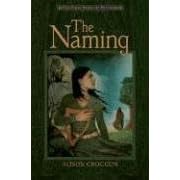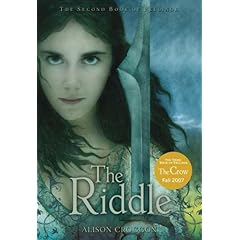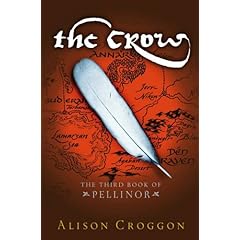


These books are AWESOME! How's that for an endorsement? I have really been enjoying this teen series. I have, just today, finished The Riddle. The books of Pellinor are a planned quartet, I understand book IV will be called The Singing and as the final installment, it will be published in mid-2008. We have a copy of The Crow although the cover doesn't look at all like what I have pictured above, it is actually done more in the style of the first two.
This series will surely be compared to the Lord of the Rings and I do feel this is a fair comparison as they are both fantasy adventure stories and wage the war of good versus evil. In this series it is the Light versus the Dark. I have also noticed some similarities to Tolkein in that there is a dictionary of pronunciations and special words, there are footnotes and explanations of where the story came from (lost records recently translated) and it makes you wonder if there wasn't really a lost kingdom.
The Naming opens when Maerad, a sixteen year old girl, is discovered and rescued by Cadvan, a Bard (similar to an elf in LOTR). Maerad was a slave, she remembered being captured along with her mother, on the same night her father and baby brother were killed and her town burned. Maerad was just seven years old at the time. Her mother perished in captivity, Maerad was left to fend for herself. Cadvan was hiding in a barn when Maerad was assigned to milk the cows. He was astonished when she could see him as he had worked an invisibility charm so he could rest, unseen by humans. Only other Bards can see through such a charm, so he knew she was one. Maerad was unaware of her powers, and was shocked to learn of them. Cadvan rescued her from captivity and introduced her to the world of Barding. If that were all this would be a very charming story without much to sink your teeth into. This story is not charming. This story is full of twists and turns to keep me up late turning the pages until my eyes droop and the book tumbles to the floor, released in my slumber. Of course the crash wakes me up, and being an insomniac, I get to read a bit more.
These characters are compelling. I read LOTR but have not been a big fan of fantasy, ever. In this story of Pellinor, I find myself enjoying the adventure, the surprises, and the battles. The descriptions are sufficient and enthralling without dragging on for pages. There is a little element of romance hidden in the undercurrent of the story, I don’t know where that will lead. This is a ‘coming of age’ book in that Maerad is growing into a woman. Maerad is also the powerful figure in the book, meaning much rests on her shoulders. Comparing her to LOTR characters, I would say she is the most powerful and liken her to Gandalf the White, except that she does not appear to be all good. She has much power like Galadriel and Saruman. She is untrained in her powers and therefore is very dangerous, yet she is the heroine in the book and is fighting for the Light (rather obviously the good) against the Dark (the forces of evil). But within her is much innocence like Frodo or Sam. Also like Frodo, the survival of the kingdom rests on her.
A criticism I have in the writing of the book is there is some predictability in Maerad’s reactions. She is often afraid of ridiculous things and fearless in the face of grave danger. It is a bit tiresome to have her continuously doe eyed and wide mouthed at the awesomeness and grandeur of the kingdom. It was amusing and expected at first, considering she was a slave since she was seven and sheltered from life outside of the encampment, but this innocence at times seems a little forced and has tried my patience due to overuse. In the overall scheme, it is a small complaint.
There are a couple of references I haven't liked in the books, such as when Cadvan states in The Riddle “It is not true that suffering is good for the soul. Too much, and even the strongest will break.” This is true, that even the strongest can break under overwhelming suffering, but I like to see fearlessness in the suffering characters. Once again, this is a minor issue. Also, I’m not sure why the author continues to mention every menses that Maerad experiences. I am assuming there is a point to this, as there was a point when it was the menarche. It may very well be to mark the passage of time as I’ve been able to keep track of the months this way, but wouldn’t it be nicer to mark time in some other manner? Perhaps I’m a bit overly sensitive, I prefer things to be left to the realm of the unmentioned, especially in teen literature.
Overall, however, I would have to say that at this point in my reading, finished with the second book of four, I am very impressed. The women are strong, and in positions of power. This being incongruous with motherhood is handled quite neatly by the fact that Bards live a very long life. The fertility of a Bard is relatively short compared with their life expectancy, so they are able to raise a family and then go on to long lives of powerful careers. It is an interesting twist to the usual role of women in an epic fantasy. I am the polar opposite of a feminist, but I have enjoyed the strong feminine roles in this story.
This is a series for your Christmas gift giving lists. I would recommend it for girls ages 14 and up. I would hesitate to give it to a teen boy without clearance of his mother due to my sense of modesty about the vivid descriptions of Maerad’s learning how to deal with her menarche. It certainly isn’t a central theme in the book, but it is a recurring one.
There are plenty of moments where you will cry, rejoice, and have a knot in the pit of your stomach. I would not say that Alison Croggon is in the same league with Tolkein at all, but she has created a gripping tale, replete with unforgettable characters that tug at your heart strings, a vivacious mixture of good and evil, and most aren’t clearly one or the other. I was especially impressed with the sacrifice exhibited by many of the main characters. They truly sacrifice themselves for the good of all. Through their mistakes they retain a humanity that makes you love them. When they plough on despite those mistakes and face down tremendous challenges they make you cheer. When the characters sacrifice themselves, their freedoms, or their desires for the greater good, they make you cry. What more could you want from a series? I can’t wait to read the next two.
2 comments:
Just getting a chance to read this...it sounds like a series my daughter would love. I'm going to have to look into it now. Thanks talking about it, Lily!
I absolutely love your review! The similarities between the characters in LOTR and this are pretty accurate. But I do like that though there are similarities, there are still quite a few differences. Fantastic series that I can't wait to finish up!
Post a Comment